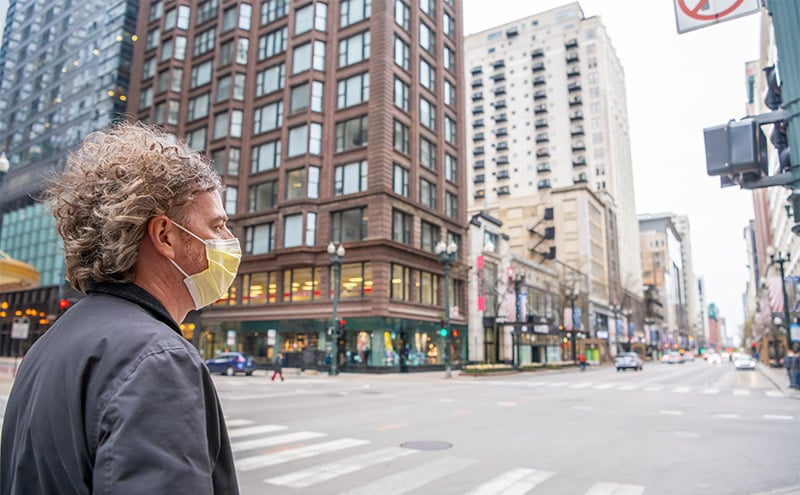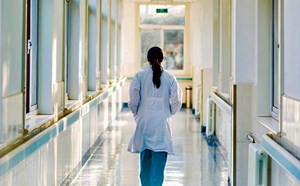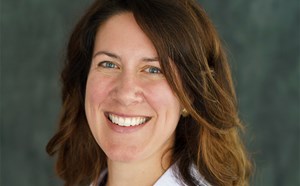
Reflections Post-COVID-19’s First Wave from Chicago
“You’re gonna need a bigger boat!” This line from Jaws continued to replay in my mind in late January, as our HICS group activated and discussed worst-case scenarios of patient volume. In the coming weeks, we worked tirelessly to prepare for the onslaught of patients that our fellow emergency physicians were contending with in other areas of the globe.
Like so many others in our too-small-of-a-boat situation, we quickly enacted what came to be the typical implements: forward triage, a tent testing/treatment area (although we had the good fortune of having a large vacant warehouse-like unfinished space next to our emergency department (ED) for an indoor tent-like process), expanding treatment space into corridors/admin areas/closets, standardizing PPE processes, increasing social distancing, etc. We re-wrote our code protocols, created numerous new COVID SOPs, reversed air flow in areas we did not know we could reverse airflow, became facile with quickly starting oxygen delivery via high-flow nasal cannulas, and prepared to, as our CMO instructed, “unapologetically over-communicate!” Thousands of patients later, Chicago experienced a reprieve from the first COVID-19 wave.
Maya Angelou said, “people will forget what you said, people will forget what you did, but people will never forget how you made them feel.” In reflecting on the early days of the pandemic, there is a single memory/feeling that predominates … the overwhelming sense of fear of the unknown. Sure, emergency physicians are trained to manage any patient/condition that comes through our doors; we are also astute clinicians trained to acquire and synthesize voluminous data points to expertly manage these patients. In the early days of COVID-19, we had neither the data (transmissibility, infectivity, or otherwise) nor experience to fully comprehend exactly what threat we were up against. With chilling echoes of stories of hospitals running out of ventilators and ICU beds, provider shortages requiring non-critical care trained physicians (like dermatologists!?!) to help run ICUs, and watching as our PPE supplies dwindled, we faced each shift with an unsettling combination of ignorance and dread. Could we go home safely? Would we see our families again (after a self-imposed quarantine…or ever?!?)? How do we protect ourselves and each other, let alone the patients who come to us seeking help? Our EDs confronted these fears, and we showed up to work prepared to treat our patients…and be there for each other.
Preparing for emergency physicians falling ill, our ED trained and assigned shifts to over 50 non-emergency physicians to treat patients in our low-acuity area of the ED. We thought that if our emergency medicine (EM) ranks wore thin, our emergency physicians would “fall back” to the ED’s critical care areas, and the low acuity patients would be managed by non-EM volunteer (perhaps somewhat volun-told) providers. Thankfully, apart from training shifts, we never needed to deploy this contingency plan; however, it focused a spotlight on the uniqueness of our specialty, and I would like to close with a final reflection on what this journey has highlighted.
I would like to offer one last thank you directly to our emergency physicians, my partners and colleagues. Beyond the swelling pride I feel from your fearless dedication to our patients, your families/friends, and each other, I marvel at the wide-reaching and irreplaceable expertise you command. Absolutely no other specialty can step into the ED and replace you. On any given day, from one patient to the next, you are prepared to immediately manage a COVID-infected patient, then a heart attack, then a stroke, then deliver and resuscitate a baby, then stabilize a GSW patient, then treat a seizure, then reduce a dislocated shoulder, then treat a septic febrile neutropenic patient, and the list goes on…across every medical specialty, across the entire patient population. You truly are our frontline providers, putting yourself at risk in these harrowing time. I am proud to stand with you …prepared for the next COVID-19 wave.
Tom Spiegel, MD, MBA, MS, FACEP
Chair-Elect, Medical Director Section
ED Medical Director, University of Chicago



